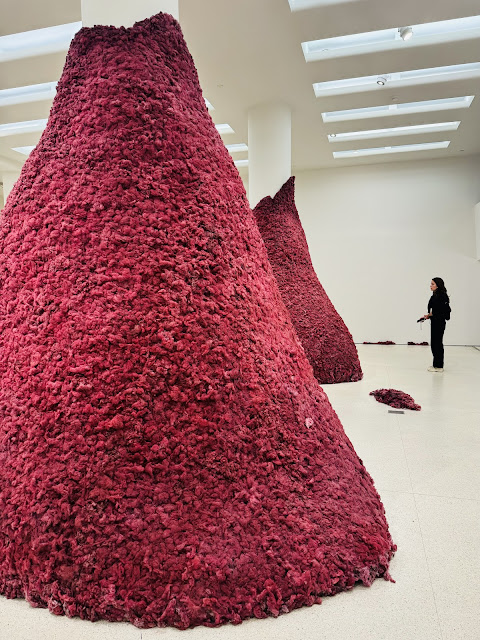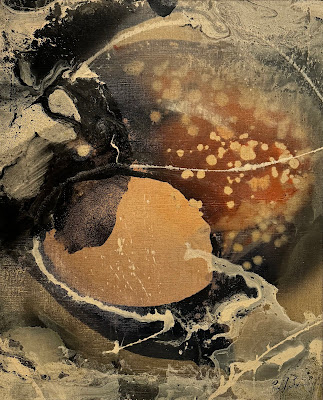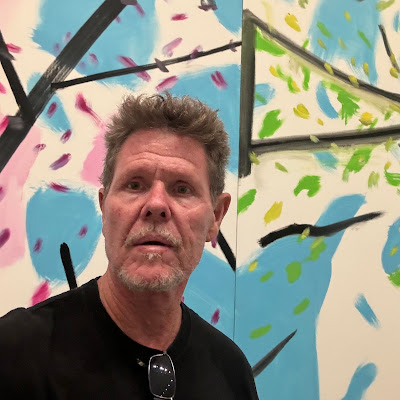I picked up this painful memoir by Primo Levi, who was interned at Auschwitz at the age of 24, knowing I soon would be visiting the place whose name instantly evokes evil. His book is nothing less than an autopsy of the human condition that beggars belief: how could people survive such torturous conditions? He posits that they fall into two categories, the "drowned" and the "saved." The vast majority--he calls them "musselman," a German word of unknown etymology--fall into the former and soon die, whether from starvation, illness or gassing. The few who are "saved"--certainly not in the Christian, or spiritual sense--have something extra.
At Auschwitz, in 1944, of the old Jewish prisoners (we will not speak of the others here, as their condition was different), “kleine Nummer,” low numbers less than 150,000, only a few hundred had survived; not one was an ordinary Häftling [prisoner], vegetating in the ordinary Kommandos, and subsisting on the normal ration. There remained only the doctors, tailors, shoemakers, musicians, cooks, young attractive homosexuals, friends or compatriots of some authority in the camp; or they were particularly pitiless, vigorous and inhuman individuals, installed (following an investiture by the SS command, which showed itself in such choices to possess satanic knowledge of human beings) in the posts of Kapos, Blockältester, “ etc.; or finally, those who, without fulfilling particular functions, had always succeeded through their astuteness and energy in successfully organizing, gaining in this way, besides material advantages and reputation, the indulgence and esteem of the powerful people in the camp. Whosoever does not know how to become an “Organisator,” “Kombinator,” “Prominent” (the savage eloquence of these words!) soon becomes a “musselman.” In life, a third way exists, and is in fact the rule; it does not exist in the concentration camp.
Needless to say, it had never occurred to me that being an "attractive young homosexual" would confer a survival benefit in a concentration camp, but that's the terrible beauty of this book. Levi bears such specific witness to the Nazi atrocities--and their impact on the prisoners, both Jewish and not--that they can never be denied. A trained chemist, he writes from an almost clinical perspective. Take, for example, the situation of dysentery patients, who don't want to give up the relative comfort of a "hospital" stay: they are forced to line up on a daily basis and shit on command, which of course leads to a black market in watery stools among the prisoners. As the cliche says, you can't make this stuff up.
That Levi wrote this book just three years after leaving Auschwitz also gives his recollections a freshness and immediacy that remains 80 years later. It echoes and validates my own childhood impressions of the event, after my father took me to a Holocaust museum in Paris. "If there is a God, how could God have let this happen? " I asked. Survival in Auschwitz has done nothing to dispel my early atheism.
And night came, and it was such a night that one knew that human eyes would not witness it and survive. Everyone felt this: not one of the guards, neither Italian nor German, had the courage to come and see what men do when they know they have to die.
* * * *
Here then, before our very eyes, under our very feet, was one of those notorious transport trains, those which never return, and of which, shuddering and always a little incredulous, we had so often heard speak. Exactly like this, detail for detail: goods wagons closed from the outside, with men, women and children pressed together without pity, like cheap merchandise, for a journey towards nothingness, a journey down there, towards the bottom. This time it is us who are inside.
* * * *
The climax came suddenly. The door opened with a crash, and the dark echoed with outlandish orders in that curt, barbaric barking of Germans in command which seems to give vent to a millennial anger.
* * * *
We are once again at the foot of the pile. Mischa and the Galician lift a support and put it roughly on our shoulders. Their job is the least tiring, so that they show excess zeal to keep it: they shout at companions who dawdle, they incite them, they admonish them, they drive on the work at an unbearable pace. This fills me with anger, although I already know that it is in the normal order of things that the privileged oppress the unprivileged: the social structure of the camp is based on this human law.
* * * *
Thousands of individuals, differing in age, condition, origin, language, culture and customs are enclosed within barbed wire: there they live a regular, controlled life which is identical for all and inadequate to all needs, and which is much more rigorous than any experimenter could have set up to establish what is essential and what adventitious to the conduct of the human animal in the struggle for life.
We do not believe in the most obvious and facile deduction: that man is fundamentally brutal, egoistic and stupid in his conduct once every civilized institution is taken away, and that the Häftling is consequently nothing but a man without inhibitions. We believe, rather, that the only conclusion to be drawn is that in the face of driving necessity and physical disabilities many social habits and instincts are reduced to silence.
* * * *
However little sense there may be in trying to specify why I, rather than thousands of others, managed to survive the test, I believe that it was really due to Lorenzo that I am alive today; and not so much for his material aid, as for his having constantly reminded me by his presence, by his natural and plain manner of being good, that there still existed a just world outside our own, something and someone still pure and whole, not corrupt, not savage, extraneous to hatred and terror; something difficult to define, a remote possibility of good, but for which it was worth surviving.
* * * *
It is lucky that it is not windy today. Strange, how in some way one always has the impression of being fortunate, how some chance happening, perhaps infinitesimal, stops us crossing the threshold of despair and allows us to live. It is raining, but it is not windy. Or else, it is raining and is also windy: but you know that this evening it is your turn for the supplement of soup, so that even today you find the strength to reach the evening. Or it is raining, windy and you have the usual hunger, and then you think that if you really had to, if you really felt nothing in your heart but suffering and tedium — as sometimes happens, when you really seem to lie on the bottom, — well, even in that case, at any moment you want you could always go and touch the electric wire-fence, or throw yourself under the shunting trains, and then it would stop raining.
Some say that Levi, who suffered from depression, died from suicide at the age of 67. Elie Weisel went so far as to observe that "Levi died at Auschwitz 40 years later." But I'd like to think that Survival In Auschwitz offers the same solace that sustained Levi for the remainder of his life: the memory (or example) of individual goodness and the sustaining power of art. One need only remember Levi's desperation to recall lines from Dante's Divine Comedy for another of the "saved" who has shown him a kindness as a means of impressing upon the young Alsatian student their shared humanity.






































































